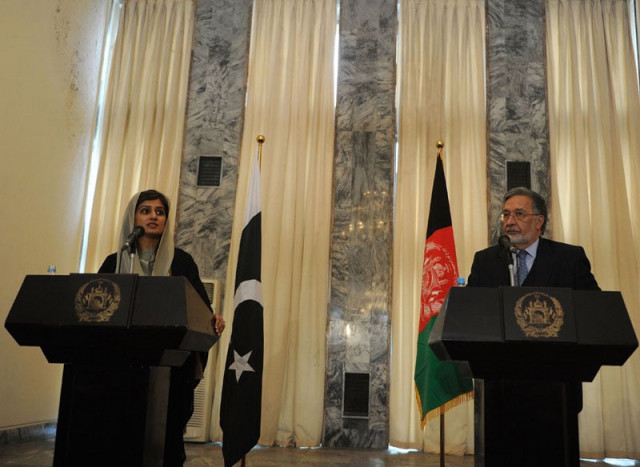Pakistan denies hidden agenda, Taliban deny talks
We have no hidden agenda, Khar tells reporters after meeting with President Hamid Karzai.

The statements came as a leaked NATO report charged that Pakistan's security services were backing the Taliban militia, who consider victory inevitable once Western combat troops leave in 2014.
The leak was spectacularly bad timing for Foreign Minister Hina Rabbani Khar, who was in Kabul for the first time since taking office last year in a bid to thaw frosty ties between the two neighbours.
"We have no hidden agenda in Afghanistan," Khar told reporters after meeting President Hamid Karzai. "These claims have been made many, many times. Pakistan stands behind any initiative that the Afghan government takes for peace."
The Taliban chose the same day to deny that they would soon hold talks with Karzai's government in Saudi Arabia to end the decade-long war since they were toppled by a US-led invasion in 2001.
"There is no truth in these published reports saying that the delegation of the Islamic Emirate would meet with representatives of the Karzai government in Saudi Arabia in the near future," the Taliban said on their website.
Afghan officials had suggested that talks in Saudi Arabia would be in addition to contacts in Qatar between the Taliban and the United States.
But it was never clear whether the Taliban, who have resisted talks with the Afghan government, or the Saudis, who have conditioned involvement on the Taliban renouncing al Qaeda, would come on board.
Taliban negotiators have begun preliminary discussions with the United States in Qatar on plans for peace talks aimed at ending the war.
But they said in their statement Wednesday that they had not yet "reached the negotiation phase with the US and its allies".
"Before there are negotiations there should be a trust-building phase, which has not begun yet," the statement said.
One of the Taliban's demands is for the United States to free five of its leaders from detention in the US military prison in Guantanamo Bay.
The leaked NATO report - seen by The Times newspaper and the BBC - was compiled from information gleaned from insurgent detainees and was given to NATO commanders in Afghanistan last month.
The "State of the Taliban" document claims that Islamabad, via the Inter-Services Intelligence (ISI) agency, is "intimately involved" with the insurgency and that the Taliban assume victory is inevitable once Western troops leave in 2014.
Pakistan's foreign minister said "we consider any threat to Afghanistan's independence and sovereignty as a threat to Pakistan's existence.
"Pakistan and Afghanistan need to look forward to a relationship based on trust."
Afghan Foreign Minister Zalmai Rasoul told the same news conference: "There will be no peace in the region if there is no serious regional cooperation.
"Pakistan plays a key role in Afghan peace process. I hope Ms Rabani's visit is the beginning of a good relationship between our two countries."
Kabul government officials declined immediate comment on the report.
Khar's Afghanistan trip to 'mark new cooperation phase'
Pakistan Foreign Minister Hina Rabbani Khar's meeting with Afghan President Hamid Karzai on a one-day visit to Kabul Wednesday aimed at warming frosty ties between the two neighbours.
"This visit will mark a new cooperation phase between the two countries," Afghan foreign ministry spokesman Janan Mosazai told reporters ahead of what will be Khar's first visit to Afghanistan since taking office in July.
Kabul, which accuses Islamabad of supporting the 10-year Taliban insurgency in Afghanistan, put relations on ice after the September murder of its peace envoy Burhanuddin Rabbani, which one Afghan minister blamed on Pakistani spies.
The Kabul government said the bomber who killed Rabbani was a Pakistani and accused the Pakistani government of hindering the investigation.
"After the death of Rabbani we boycotted some of the bilateral and trilateral meetings (including the US) with Pakistan," a senior official in Karzai's office told AFP.
"This visit is aimed at improving our relations as well as at resuming those meetings."
In December, Pakistan boycotted the Bonn conference on the future of Afghanistan to protest against US air strikes that killed 24 Pakistani soldiers along the porous Afghan border on November 26.
Khar meets her Afghan counterpart Zalmai Rasoul and Karzai amid tentative moves towards negotiations in Qatar between Washington and the Taliban, who were ousted from power by the 2001 US-led invasion.
Karzai has given his blessing to the Taliban opening a political office in the Gulf state, but is wary of being sidelined and has insisted that his government has a central role in any peace talks.
In Islamabad, foreign ministry spokesman Abdul Basit said Khar's talks would cover "the security situation in Afghanistan and the reconciliation process".
"We hope the visit would further enhance mutual understanding on major issues and bring the two countries closer," he told AFP.
Pakistani analyst Rahimullah Yusufzai said Khar's trip was important because it is her first to Afghanistan and comes after a gap in Pakistani official visits to Kabul, the last of which were soon after Rabbani's murder.
He said both governments "feel a bit left out" of the Qatar negotiations and "would be trying at least to find out what is happening and maybe try to coordinate their own policies accordingly".
But he said many problems between the two countries remain unresolved, including the Rabbani assassination, adding: "I don't expect any real breakthrough at these talks."


















COMMENTS
Comments are moderated and generally will be posted if they are on-topic and not abusive.
For more information, please see our Comments FAQ